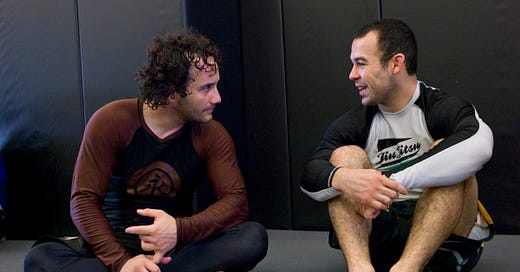Getting Good at BJJ: Patching Holes in Your Game ⛵
The Josh Waitzkin Method: Moving Toward Your Weaknesses
The Hidden Advantage: Why Fixing Weaknesses Accelerates Growth
Have you ever noticed how the best grapplers seem unbeatable in certain positions? It's rarely because they know countless techniques—it's because they've systematically eliminated their vulnerabilities.
The Leaky Boat Theory
Think about your BJJ game as a boat. You have two choices with your limited training time:
Add more sails and a bigger engine (expanding your technical repertoire)
Patch the holes where water is leaking in (fixing recurring mistakes)
Both approaches have value, but most of us naturally gravitate toward option #1. It's exciting and feels like tangible progress. But there's extraordinary potential in option #2 that often goes untapped.
As a black belt, I can tell you that nearly 90% of the trouble I encounter in sparring comes from just 1-2 specific scenarios that I've neglected to fix. This pattern is even more pronounced at earlier belt levels.
Identifying Your Leaks
Take a moment to reflect on the last five times you were submitted. Is there a pattern?
Are you getting caught in the same submission repeatedly?
Always ending up in disadvantageous positions?
Are you struggling with specific transitions?
If you have developed your BJJ awareness, you might even identify the root cause further upstream—perhaps your takedown head placement is consistently putting you in vulnerable positions.
Even if you can't pinpoint exactly why you're repeatedly getting armbarred, you can still patch that hole by becoming exceptionally good at late-stage armbar defense.
The Courage to Face Weaknesses
This is where ego enters the equation. It takes real courage to deliberately train in areas where you're weakest.
Consider how many grapplers abandon wrestling entirely after being caught in submissions repeatedly. Rather than improving their entries or developing solid defenses, they simply avoid the problem altogether.
Imagine the alternative: becoming so proficient at defending ankle locks that they transform from a major threat into an opportunity. Or developing such confidence in your submission defense that you can finally unleash your full potential without hesitation.
The Growth Philosophy
This approach was crystallized for me by Josh Waitzkin (Marcelo Garcia's first black belt) during his appearance on Joe Rogan's podcast. He advocates for deliberately moving toward your flaws rather than protecting or hiding weaknesses.
When you make this a philosophy—consistently identifying and addressing vulnerabilities—your entire game develops a solidity and completeness that's truly remarkable. Your "fundamentals" evolve to a depth few practitioners ever reach.
This Week's Challenge
Take this week to be brutally honest about your technical gaps:
Identify one recurring "hole" in your game
Commit to spending focused time addressing it
Rather than avoiding situations that expose this weakness, seek them out
Yes, this is more abstract than a specific technique breakdown, but I genuinely believe this approach has more potential to transform your jiu-jitsu than any single move I could teach you.
What I'm Studying
I'm currently working through some new front headlock control systems and testing concepts from recent instructionals. Keep an eye out for Anaconda-inspired emails in the coming weeks as I integrate these principles into my own game.
What's your biggest "leak" that you've been working on fixing? Reply and let me know—I'm curious to hear what patterns emerge across our community.
Oss 👊




Great post, I can relate with the ego part.
I been working on my Ankle Lock and Triangle Choke defense. I already got really good at escaping fully lock in triangles but still struggling with Ankle Locks (there's progress tho).
Deciding that I needed to improve my Ankle Lock defense was easy because I got submitted multiple times in competition with it, but for the triangle I had to eat my ego.
I usually do a good job avoiding triangles but I noticed that when I did get into one I was getting submitted always, so I started working on it and doing specific rounds. Right now I'm pretty confident on My late-stage escapes.
Powerful post with excellent reflective questions. The Art of Learning is one of my favorite books!